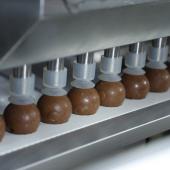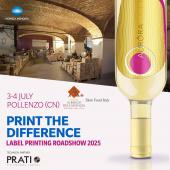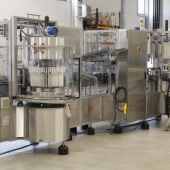Redefining secondary packaging practices of consumer goods
Cama realizes modular and highly flexible automation systems for the secondary packaging of various types of consumer goods, that can deliver multiple shelf-ready formats. And a close active collaboration with an HPC customer results in a concept for the packaging of aerosol cans that redefines industry standards.
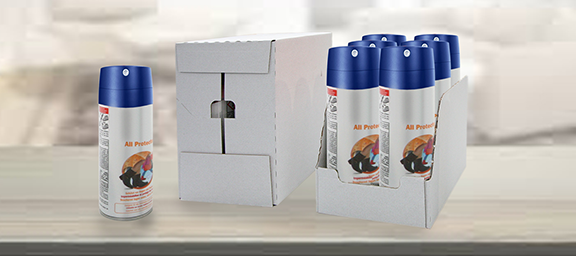
In response to the current needs of marketing, more and more oriented towards commercial strategies and different types of products, many leading consumer product (CPG) and health and personal care (HPC) companies are demanding far greater flexibility and agility from their OEM machine suppliers.
Traditionally a stalwart of the confectionary and bakery sector, Cama Group has bought its packaging expertise and technology into the CPG and HPC domain, delivering shelf-ready packaging solutions that far surpass those from many of the industry’s traditional suppliers.
Jasper Joosten, Global Key Account Manager, Health, Personal & Homecare at Cama explains: «In general, in the homecare market, there is a tendency for higher in-feed and box speeds, which is not always conducive with creating packaging that has the all-important visual appeal. This style of shelf appeal has always been important in food sector and, as such, this type of packaging format is much more developed. Indeed, we are now seeing many CPG and HPC companies looking to food industry suppliers, such as Cama, who can supply machines that work from blanks that will eventually deliver good shelf appearance.
«High output and flexibility is not a strong point of traditional suppliers either - he continues - where packaging in-bulk and mass shipping has taken precedent over aesthetics. We see the same opportunities in other markets and products, where speed coupled to appealing visuals is starting to define future plans».
AN EXEMPLARY HISTORY FOR THE HPC SECTOR
Cama has recently worked with a leading global HPC brand, to develop an aerosol-can packaging solution that delivers all the key facets of this modern approach: speed, agility, flexibility, careful product handling and, of course, shelf-ready packaging.

The Cama IF - based on the company’s award-winning modular Monobloc architecture - offers users a unique combination of integrated packaging machines and robotic loading units.
Through tight integration of each of the primary modules (forming, loading and closing), Cama has developed a machine that delivers the incredible flexibility demanded by the HPC industry, but within a reduced footprint.
Joosten clarifies the approach put in place within the partnership: «We worked very closely with the customer on the design and realisation of this variant. It was part of an internal development project that had been formulated to address rapidly changing market demands in terms of product variety and the resultant changes in packaging formats, but without sacrificing quality or visual appeal. The customer still needed high throughput, though - he continues - so we brought our expertise from the other industries we serve and deployed them in a machine that we think will redefine CPG and HPC packaging going forwards».
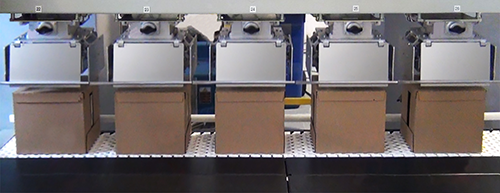
3 flaps boxes robotic closing area
The box for the aerosol cans is formed, in parallel, on a forming machine, which has the ability to create boxes that can accommodate a wide range of product counts, diameters and heights.
Once the boxes are formed, the cans are picked up individually - in groups/counts defined by the packaging recipe - by a dedicated a multi-format gripper; the technology for which was developed in collaboration with the customer. A quality control solution, delivered by a Cognex camera-based vision system, then checks the product count and cap quality, before the boxes are passed to a closing station, which completes the packaging operation.
«Each individual gripper can be adjusted - Joosten elaborates - meaning there is minimal re-engineering when the product format changes. This flexibility and changeover speed is reflected in the machine’s other modules. As a result, it can handle 14 different box configurations and multiple different product formats.
«Tightly integrated automation provides the differentiation here - Joosten enthuses - with servo motors providing the majority of the axes control. These servo solutions are complemented by our own two-axis robotic loading technology, which has been designed in-house to closely match our machine’s operational parameters.
With a choice of Rockwell Automation or Bosch automation solutions, the customer gains the ability to more easily integrate the machine into their wider enterprise. In this application, a Rockwell Automation control architecture was deployed, which was backed up by the automation supplier with training for the customer.
The result of all this development work and close collaboration with the end user, is a machine that can gently and accurately package a wide variety of products in a range of shelf-ready packaging formats at a rate of up to 60 boxes per minute - a throughput figure much higher than any of Cama’s competitors could commit to.
«We now have some amazing references in the CPG and HPC industries, including multi-variety product packaging applications» Joosten expands.
«Flexibility is totally key, combined with shelf-ready cases and high line output. We can also easily address any Industry 4.0 and IIoT initiatives, as the control solutions we deploy offer seamless connection to plant-wide systems.
And, to strengthen our design capabilities - and to make life easier for our customers - we are working on virtual commissioning and digital/virtual twins, too, alongside our own software and control applications that communicate with higher level control systems, while delivering robust cybersecurity. The customer came to us, because like them, we have a global presence, with offices throughout the world» Joosten concludes.
«They recognised that if their own supplier base did not offer the technology and solutions they required they would need to look elsewhere; and this led them to us. We have since signed a global agreement for the supply of technology to other plants. Our capabilities span multiple industries and what we learn in one we can deploy in another - it is a constantly evolving process, which strengthens our capabilities and the services we can offer to our customers».














